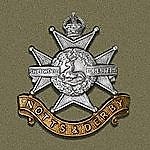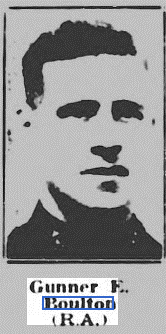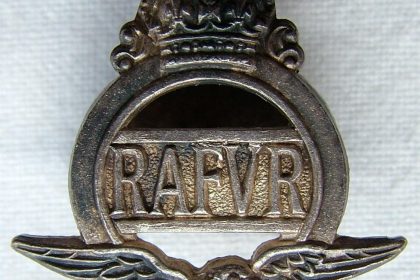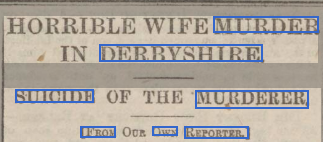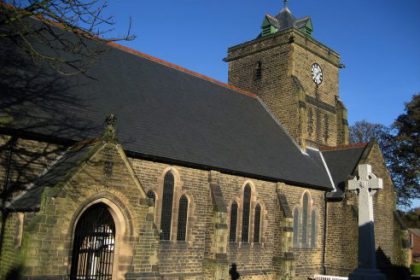THE MOSBRO’ CRIME. The Lord Chief Justice on “That Sickening, Heart breaking, Dismal Curse of Drink”. -:
Five Years Penal Servitude
Solemn were the words of the Lord Chief Justice of England, Lord; Russell at the Derby Assizes on Monday, as he’d five years’ penal servitude on a man in the prime of his life for the man slaughter of his neighbour at Mosbro’ “That sickening, heart-breaking, curse of drink, drink, drink,” was the fierce explanation given by the Judge of a crime which caused a young man to be in serious peril of his life.
Christopher Taylor, 43, collier, was indicted for the wilful murder of Emily Bird, at Eckington, on December 2nd. When stood in the dock at noon he appeared very concerned. The prisoner pleaded not guilty.
Mr Bonner, with whom was Mr gee, appeared on behalf of the Treasury to prosecute (instructed by C. W. Alderson of Eckington and Appleton instructed by Mr J. T. Jones, solicitor, Eckington), defended the prisoner.
Mr Bonner said the deceased was the wife of Henry Bird, collier, who lived at Mosbro’ Moor near Eckington. The prisoner was also collier and resided 40 yards away. Apparently before the 2nd December there was no ill-feeling whatever existing between the prisoner Henry Bird or his wife. On the Saturday morning about 11 o’clock, Henry Bird, the husband of the deceased woman, saw the prisoner in the garden with a gun under his arm. No words took place between them, and there was no quarrel. In the evening of the same day. shortly before eight o’clock. Bird was the house of a- named Staniforth, along with his wife. While he saw the prisoner the lane front of house, about 20 yards away. He heard the prisoner, much to his surprise, using threats towards him (Bird). He heard him say “I will set your house on fire and blow your brains out.” This was repeated several times, and a considerable amount bad Language” was, used.
The accused was told to mind! what he said, or he might be taken somewhere else (meaning the lock-up). The prisoner then climbed over a wall and entered a garden, tramping on the plants belonging to Bird.
The wife of the prisoner asked Mr Bird not to take any notice of this action, as her husband was drunk. Taylor replied that the plants were damaged and would have to be paid for. Bird’ ‘then went into the house and the prisoner was still in the garden, when his coat was lost. This was found, and Mrs Taylor returned to the house of Staniforth. Directly afterwards a footstep was heard, and someone shouted “I will blow your head off, you ……
Immediately afterwards a shot was fired, and Bird, the husband, saw his wife in the act falling. The husband ran forward, and it was discovered that she was dead. The shot from gun had apparently, gone through the door of the house, making a very small hole at a height of 4ft 6in from the ground. The shot struck Mrs Bird at the back of the neck, and passed into the skull, causing instant death. The prisoner used some strong words and called out once more, “Come out, you old —— and I will let you have another barrel”. When the police arrived, they went toward the house of the prisoner for the purpose of arresting him. Going along a hedge, the prisoner called out to them. “I can hear those twigs snapping’ if you don’t get away, I will shoot you”. They also heard him say “I will have a bonfire and burn everything up”.
Ultimately an inspector and sergeant of police arrived and forced their way into the house. They found the prisoner sitting on the edge of the bed.
They seized the gun and arrested him. The evidence seemed to point to the fact that the prisoner was not drunk on this evening. The
witnesses did not all agree as to his exact state.
Mr Appleton, for the defence said he could not help thinking that upon the depositions which his Lordship had no doubt read, there would be something which would enable the court to say the case was one of manslaughter, and not murder.
His Lordship: I should like to hear what Mr Bonner has to say.
Mr Bonner said he was willing to accede to any suggestion from his Lordship.
His Lordship: I have carefully read the depositions and while they point to the commission of a very grave crime, I think the prosecutions would be justified and I will say no more in accepting a plea of guilty of manslaughter and not pressing the charge of murder.
After a consultation between prisoner and his solicitor, a plea of guilty to manslaughter was made. Mr Appleton in defence, said that had the case gone on, he should have been able to prove one thing, but he did not know whether it would have made any difference in the end.
The prisoner had been drinking at more than one public house at Mosbro’. He had gone from Mosbro’ with his wife and called at the British Oak Inn. He was then drunk and fell on the roadside. This was seen by a man named Britton. The prisoner fell frequently and was undoubtedly drunk.
When he got to the Bird’s what happened was this: there was no quarrel, but there was some little question about the son’s wife owing the small amount of 6d to the prisoner. Taylor began talking about this to a child. Then the husband of the deceased woman began, and he was not perfectly sober, and both got nasty. A serious quarrel sprang up, and his instructions were that Bird challenged prisoner to get over the fence.
His Honour: There is nothing of that on the depositions. Mr Appleton admitted this.
His Lordship. in passing sentence, said: The learned counsel for the prosecution has taken and I conceive a proper course in accepting the suggestion that the safest verdict against you this case would be one of manslaughter. No one who has heard of the case can fail to observe that you stood serious peril your life on this occasion.
And although more merciful and safer view was to treat the case one manslaughter. yet it comes dangerously near the crime of murder. It is a most grievous crime.
Without any justification, you. under the circumstances that have been mentioned by the learned counsel, have suddenly, and without a note of warning, sent poor wo
man, who did you no wrong, to her last account. The most your learned counsel can say is to repeat the sickening, heart-breaking, dismal chorus or curse of drink, drink, drink. I do not want say more. ‘
The sentence of the court is you be sent penal servitude for five years.
The prisoner at once left the dock. He had stood throughout the proceedings and seemed to find relief in the final sentence of the Judge.
BNA © Derbyshire Times and Chesterfield Herald – Saturday 03 March 1900



